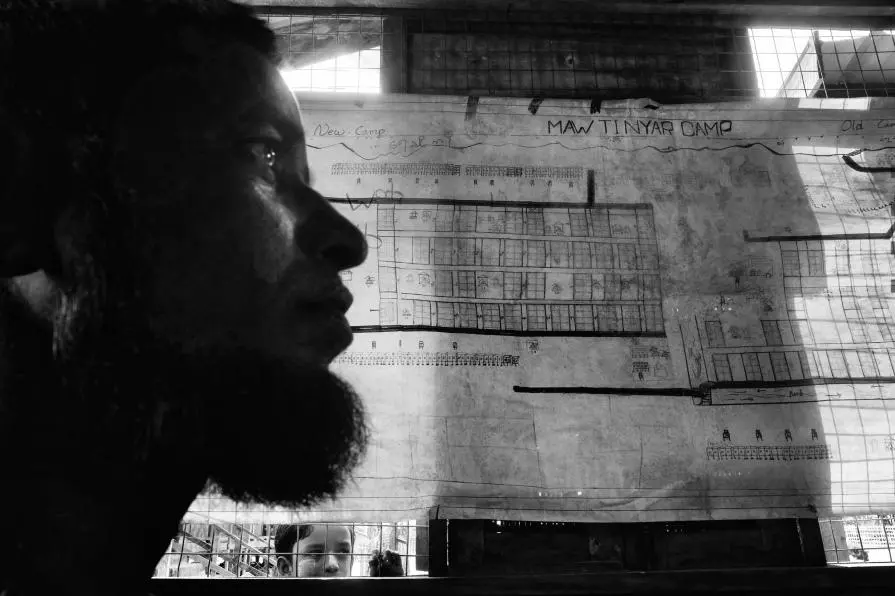
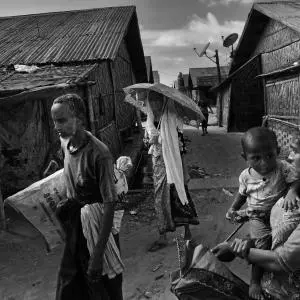
Who will save the Rohingya?
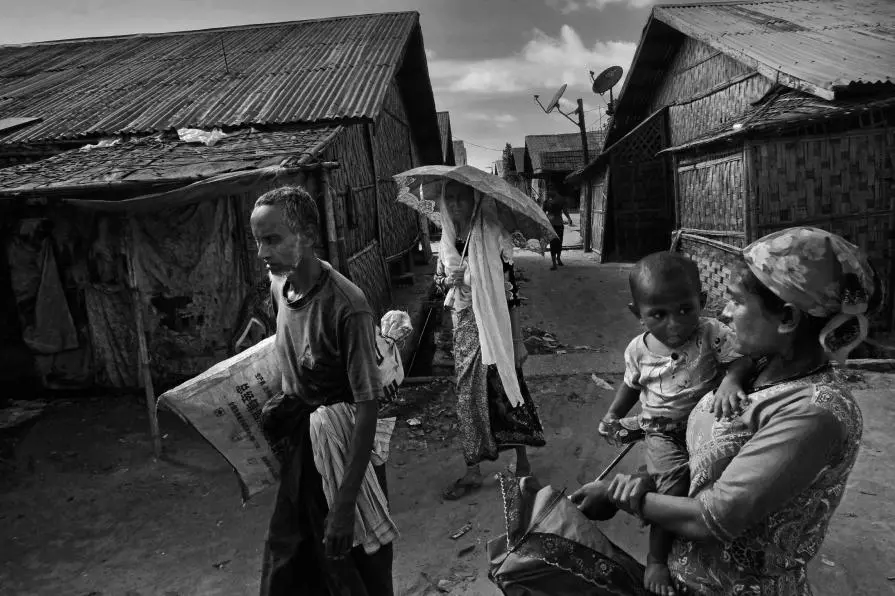
Myanmar, Rakhine State, Sittwe, That Kal Pyin village, Maw Tinyar camp, The camp is one of over 38 Rohingya camps on the perimeter of Sittwe on the western coast of Myanmar. Those who live in the IDP (Internally Displaced Persons) camps rely completely on humanitarian aid. Like any rural village, people are coming and going, buying and selling. The difference here is that they cannot leave. The bribe to raise the gate is so high no one can offord it. Even if they do get out, they cannot work or study, are refused medical care and are fearful of everyone. The hositility towards the Rohingya is so profound, the slightest incident can spark trouble. When delegations come the Rohingya are afraid to say too much for fear of reprisal by the police. "Koffi Anan visited our camp one month before (Sept. 2016) for 10 minutes and with much security, we could not say something [sic]." General caption; Who will save the Rohingya? The Rohingya Muslim minority is an inconvenient ethnic group for the new government of Myanmar. Burma (Myanmar) has a long history of conflict among its ethnic minorities propagated by an oppressive military junta. While many of the country's 135 ethnic minorities have been subjected to discrimination and human rights violations, only the Rohingya, the Muslim population of Burma's western Rakhine state that borders Bangladesh, have been stripped of all rights including citizenship (1982). They are stateless refugees, now living in IDP camps at the mercy of intolerant Buddhists. In June 2012, a cortege led by radical Buddhist monks, Rakhine Buddhist civilians (discriminated against in their own right and fueled by decades of anti-Muslim sentiment) and police stormed thru Rohingya neighborhoods in the capital of Sittwe slaughtering people, burning homes and mosques. The "conflict" (as it is commonly referred to), well-orchestrated by the government, effectively displaced approximately 140,000 Rohingya forcing them into detention camps on the outskirts of the city. Those villages that were not destroyed have been cordoned off. Today, 4 years later (Oct. 2016), be it in a camp or a village, the Rohingya have no freedom of movement, no access to comprehensive medical care or higher education, and they cannot work. They rely solely on NGOs and their own families living in freedom elsewhere. While the country's historic turn towards democracy should be encouraging, the plight of the Rohingya is far from over and on the ground the prospects for this traumatized minority look rather grim.
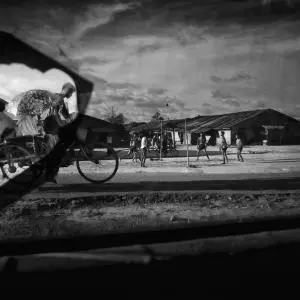
Who will save the Rohingya?
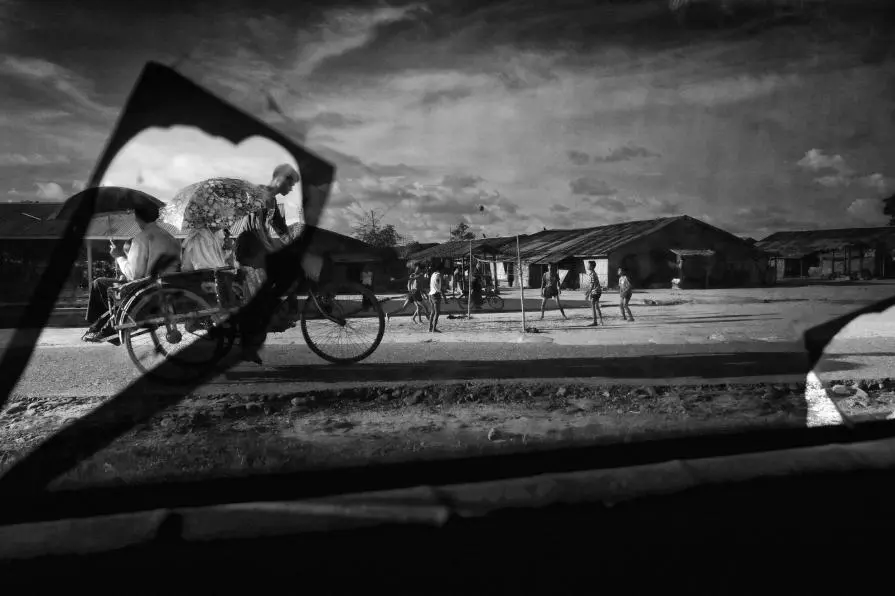
Myanmar, Rakhine State, Sittwe, That Kal Pyin village, Maw Tinyar camp, The camp is one of over 38 Rohingya camps on the perimeter of Sittwe on the western coast of Myanmar. The government does not authorize journalists or photographers to enter the area. I pass the main gate hidden in a van with black windows, driven by a man who has connections with the police at the checkpoint. On the main road leading to the camps, I shot scenes of daily life through a tear in the tinted window. A group of boys playing chinlone almost makes the place look normal. General caption; Who will save the Rohingya? The Rohingya Muslim minority is an inconvenient ethnic group for the new government of Myanmar. Burma (Myanmar) has a long history of conflict among its ethnic minorities propagated by an oppressive military junta. While many of the country's 135 ethnic minorities have been subjected to discrimination and human rights violations, only the Rohingya, the Muslim population of Burma's western Rakhine state that borders Bangladesh, have been stripped of all rights including citizenship (1982). They are stateless refugees, now living in IDP camps at the mercy of intolerant Buddhists. In June 2012, a cortege led by radical Buddhist monks, Rakhine Buddhist civilians (discriminated against in their own right and fueled by decades of anti-Muslim sentiment) and police stormed thru Rohingya neighborhoods in the capital of Sittwe slaughtering people, burning homes and mosques. The "conflict" (as it is commonly referred to), well-orchestrated by the government, effectively displaced approximately 140,000 Rohingya forcing them into detention camps on the outskirts of the city. Those villages that were not destroyed have been cordoned off. Today, 4 years later (Oct. 2016), be it in a camp or a village, the Rohingya have no freedom of movement, no access to comprehensive medical care or higher education, and they cannot work. They rely solely on NGOs and their own families living in freedom elsewhere. While the country's historic turn towards democracy should be encouraging, the plight of the Rohingya is far from over and on the ground the prospects for this traumatized minority look rather grim.
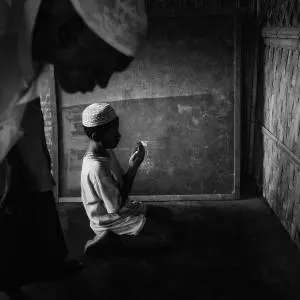
Who will save the Rohingya?
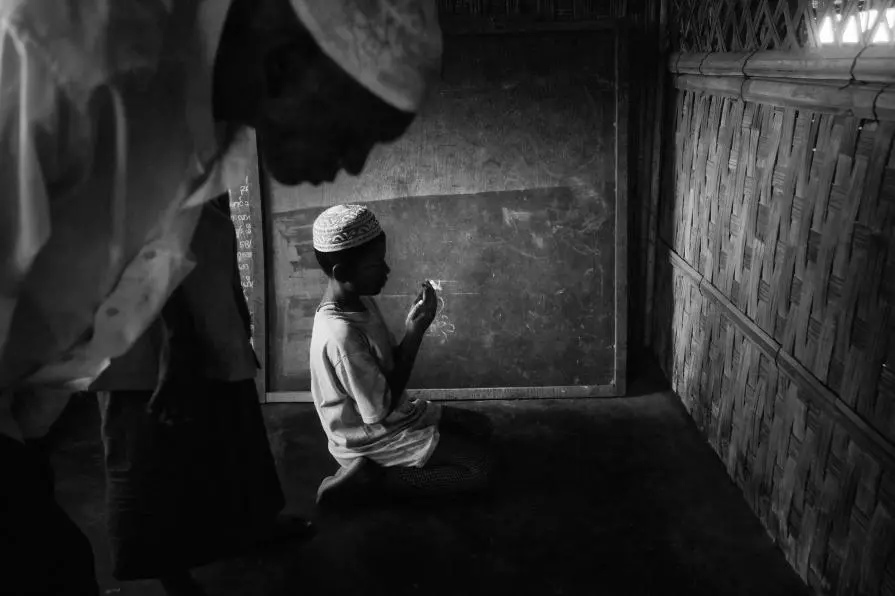
Myanmar, Rakhine State, Sittwe, That Kal Pyin village, Maw Tinyar camp, The camp is one of over 38 Rohingya camps on the perimeter of Sittwe on the western coast of Myanmar. While they take care of the camp, do odd jobs and visit other villages within the barriers, the principal activity for men in the camps revolves around prayer. All of the mosques in Sittwe, one which was over 200 years old, were destroyed by government bulldozers or cordoned off. When asked how they rationalize their situation, one man responds, "Good things are by Allah, bad things are by bad people." General caption; Who will save the Rohingya? The Rohingya Muslim minority is an inconvenient ethnic group for the new government of Myanmar. Burma (Myanmar) has a long history of conflict among its ethnic minorities propagated by an oppressive military junta. While many of the country's 135 ethnic minorities have been subjected to discrimination and human rights violations, only the Rohingya, the Muslim population of Burma's western Rakhine state that borders Bangladesh, have been stripped of all rights including citizenship (1982). They are stateless refugees, now living in IDP camps at the mercy of intolerant Buddhists. In June 2012, a cortege led by radical Buddhist monks, Rakhine Buddhist civilians (discriminated against in their own right and fueled by decades of anti-Muslim sentiment) and police stormed thru Rohingya neighborhoods in the capital of Sittwe slaughtering people, burning homes and mosques. The "conflict" (as it is commonly referred to), well-orchestrated by the government, effectively displaced approximately 140,000 Rohingya forcing them into detention camps on the outskirts of the city. Those villages that were not destroyed have been cordoned off. Today, 4 years later (Oct. 2016), be it in a camp or a village, the Rohingya have no freedom of movement, no access to comprehensive medical care or higher education, and they cannot work. They rely solely on NGOs and their own families living in freedom elsewhere. While the country's historic turn towards democracy should be encouraging, the plight of the Rohingya is far from over and on the ground the prospects for this traumatized minority look rather grim.
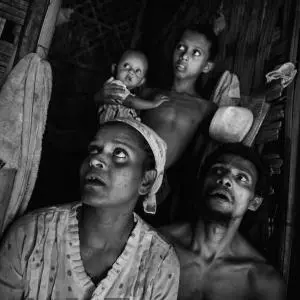
Who will save the Rohingya?
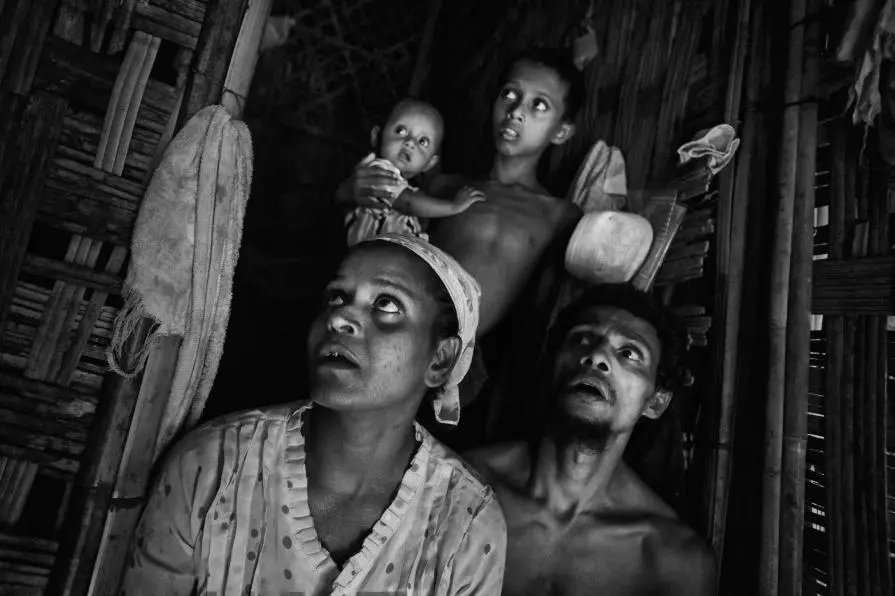
Myanmar, Rakhine State, Sittwe, That Kal Pyin village, Maw Tinyar camp, The camp is one of over 38 Rohingya camps on the perimeter of Sittwe on the western coast of Myanmar. Rachida (45) invites me into her home. She has 7 children. The oldest Tasmil is 14. The youngest, Habi Noor is just 7 months. Husband Abdul Razzak has polio. They have been here since August 24, 2013. Rachida tells me she has a heart condition but 7 months ago her treatment was cut off. She is terribly worried about her sister who left in a boat for Malaysia last year. She hasn't heard from her since. Thousands who fled by boat died or were abandoned in the open sea by unscrupulous human traffickers. Of the ones who survived, many are stuck in camps in Malaysia, Thailand and Indonesia or working in slave-like conditions to pay off debts to the traffickers. General caption; Who will save the Rohingya? The Rohingya Muslim minority is an inconvenient ethnic group for the new government of Myanmar. Burma (Myanmar) has a long history of conflict among its ethnic minorities propagated by an oppressive military junta. While many of the country's 135 ethnic minorities have been subjected to discrimination and human rights violations, only the Rohingya, the Muslim population of Burma's western Rakhine state that borders Bangladesh, have been stripped of all rights including citizenship (1982). They are stateless refugees, now living in IDP camps at the mercy of intolerant Buddhists. In June 2012, a cortege led by radical Buddhist monks, Rakhine Buddhist civilians (discriminated against in their own right and fueled by decades of anti-Muslim sentiment) and police stormed thru Rohingya neighborhoods in the capital of Sittwe slaughtering people, burning homes and mosques. The "conflict" (as it is commonly referred to), well-orchestrated by the government, effectively displaced approximately 140,000 Rohingya forcing them into detention camps on the outskirts of the city. Those villages that were not destroyed have been cordoned off. Today, 4 years later (Oct. 2016), be it in a camp or a village, the Rohingya have no freedom of movement, no access to comprehensive medical care or higher education, and they cannot work. They rely solely on NGOs and their own families living in freedom elsewhere. While the country's historic turn towards democracy should be encouraging, the plight of the Rohingya is far from over and on the ground the prospects for this traumatized minority look rather grim.
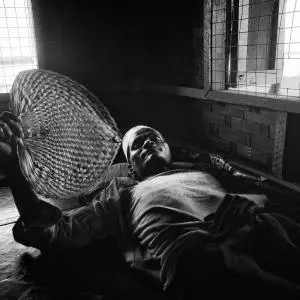
Who will save the Rohingya?
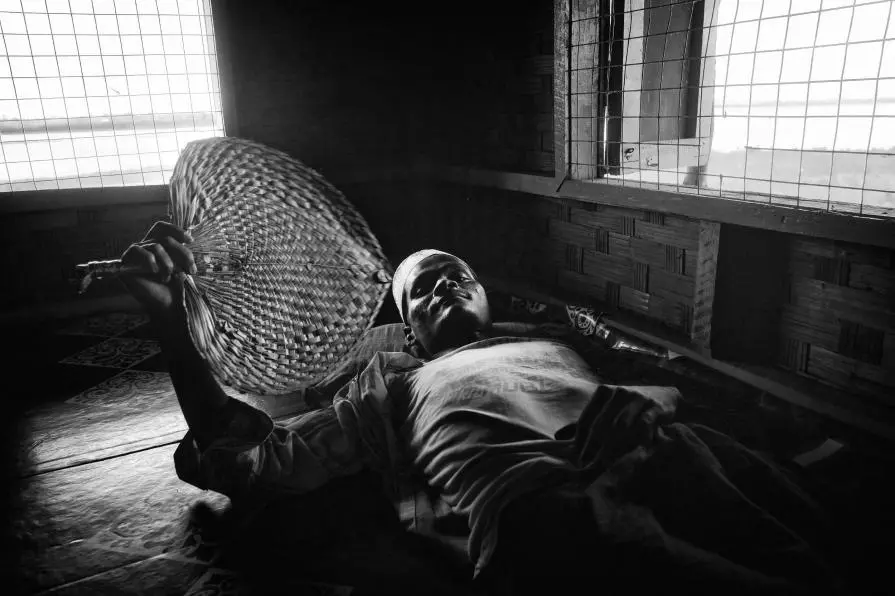
Myanmar, Rakhine State, Sittwe, That Kal Pyin village, Maw Tinyar camp, The camp is one of over 38 Rohingya camps on the perimeter of Sittwe on the western coast of Myanmar. There is no electricity in the camps. Low ceilings in the shelters and tight living quarters make the heat unbearable especially for children and the elderly. Many people spend their whole day outside but there are only a few places to get shade from the sun. General caption; Who will save the Rohingya? The Rohingya Muslim minority is an inconvenient ethnic group for the new government of Myanmar. Burma (Myanmar) has a long history of conflict among its ethnic minorities propagated by an oppressive military junta. While many of the country's 135 ethnic minorities have been subjected to discrimination and human rights violations, only the Rohingya, the Muslim population of Burma's western Rakhine state that borders Bangladesh, have been stripped of all rights including citizenship (1982). They are stateless refugees, now living in IDP camps at the mercy of intolerant Buddhists. In June 2012, a cortege led by radical Buddhist monks, Rakhine Buddhist civilians (discriminated against in their own right and fueled by decades of anti-Muslim sentiment) and police stormed thru Rohingya neighborhoods in the capital of Sittwe slaughtering people, burning homes and mosques. The "conflict" (as it is commonly referred to), well-orchestrated by the government, effectively displaced approximately 140,000 Rohingya forcing them into detention camps on the outskirts of the city. Those villages that were not destroyed have been cordoned off. Today, 4 years later (Oct. 2016), be it in a camp or a village, the Rohingya have no freedom of movement, no access to comprehensive medical care or higher education, and they cannot work. They rely solely on NGOs and their own families living in freedom elsewhere. While the country's historic turn towards democracy should be encouraging, the plight of the Rohingya is far from over and on the ground the prospects for this traumatized minority look rather grim.
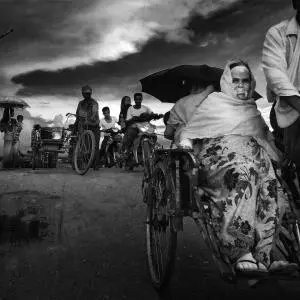
Who will save the Rohingya?
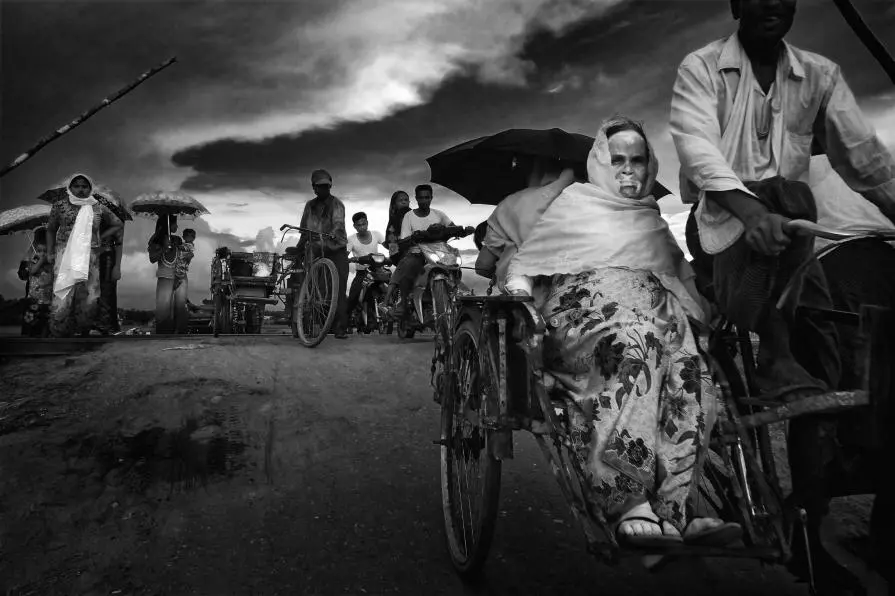
Myanmar, Rakhine State, Sittwe, That Kal Pyin village, Maw Tinyar camp, The camp is one of over 38 Rohingya camps on the perimeter of Sittwe on the western coast of Myanmar. On the road near Mansi Junction between several camps. The Rohingya have no virtually no access to adequate medical services. In 2014, Médecins Sans Frontières was expelled when government officials decided they were favoring the Rohingya. The NGOs that are left bring food, though as one man laments, « we cannot afford to buy wood to cook the rice." General caption; Who will save the Rohingya? The Rohingya Muslim minority is an inconvenient ethnic group for the new government of Myanmar. Burma (Myanmar) has a long history of conflict among its ethnic minorities propagated by an oppressive military junta. While many of the country's 135 ethnic minorities have been subjected to discrimination and human rights violations, only the Rohingya, the Muslim population of Burma's western Rakhine state that borders Bangladesh, have been stripped of all rights including citizenship (1982). They are stateless refugees, now living in IDP camps at the mercy of intolerant Buddhists. In June 2012, a cortege led by radical Buddhist monks, Rakhine Buddhist civilians (discriminated against in their own right and fueled by decades of anti-Muslim sentiment) and police stormed thru Rohingya neighborhoods in the capital of Sittwe slaughtering people, burning homes and mosques. The "conflict" (as it is commonly referred to), well-orchestrated by the government, effectively displaced approximately 140,000 Rohingya forcing them into detention camps on the outskirts of the city. Those villages that were not destroyed have been cordoned off. Today, 4 years later (Oct. 2016), be it in a camp or a village, the Rohingya have no freedom of movement, no access to comprehensive medical care or higher education, and they cannot work. They rely solely on NGOs and their own families living in freedom elsewhere. While the country's historic turn towards democracy should be encouraging, the plight of the Rohingya is far from over and on the ground the prospects for this traumatized minority look rather grim.
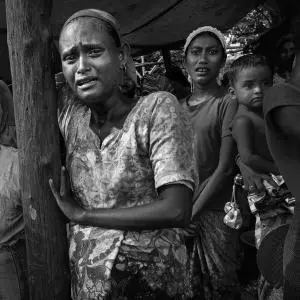
Who will save the Rohingya?
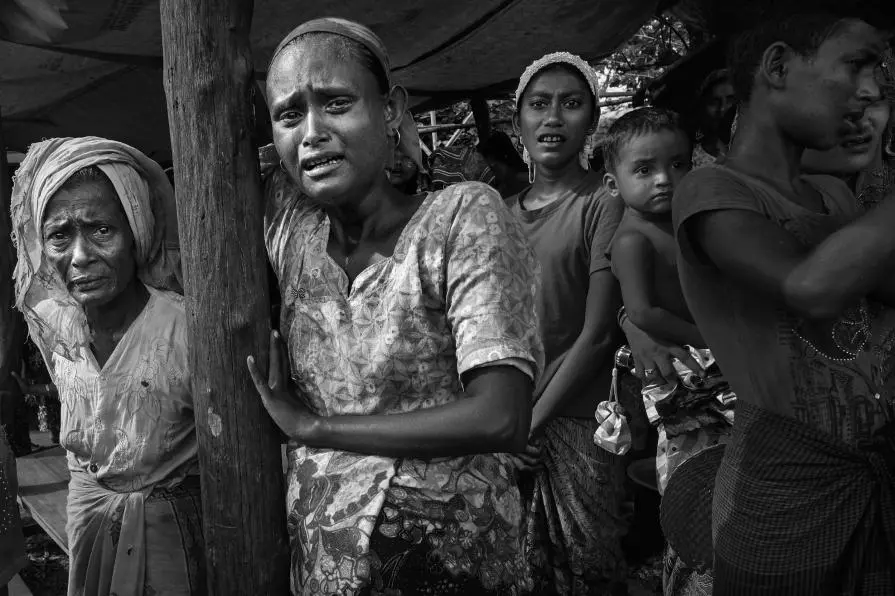
Myanmar, Rakhine State, Sittwe, That Kal Pyin village, Maw Tinyar camp, The camp is one of over 38 Rohingya camps on the perimeter of Sittwe on the western coast of Myanmar. Noor Jahan, a Rohingya woman over 60 has passed away this morning (3 October 2016). She had asthma and could not get oxygen. They took her to the clinic at the entrance of the camp. There was no doctor. So they took her to the village, but the doctor said he could not help her and she died. There are 3 other funerals in.other villages today. All due to the heat. The close family gathers around the coffin of Noor Jahan for a final farewell. They will bury her wrapped in cloth in the graveyard. They are inconsolable. General caption; Who will save the Rohingya? The Rohingya Muslim minority is an inconvenient ethnic group for the new government of Myanmar. Burma (Myanmar) has a long history of conflict among its ethnic minorities propagated by an oppressive military junta. While many of the country's 135 ethnic minorities have been subjected to discrimination and human rights violations, only the Rohingya, the Muslim population of Burma's western Rakhine state that borders Bangladesh, have been stripped of all rights including citizenship (1982). They are stateless refugees, now living in IDP camps at the mercy of intolerant Buddhists. In June 2012, a cortege led by radical Buddhist monks, Rakhine Buddhist civilians (discriminated against in their own right and fueled by decades of anti-Muslim sentiment) and police stormed thru Rohingya neighborhoods in the capital of Sittwe slaughtering people, burning homes and mosques. The "conflict" (as it is commonly referred to), well-orchestrated by the government, effectively displaced approximately 140,000 Rohingya forcing them into detention camps on the outskirts of the city. Those villages that were not destroyed have been cordoned off. Today, 4 years later (Oct. 2016), be it in a camp or a village, the Rohingya have no freedom of movement, no access to comprehensive medical care or higher education, and they cannot work. They rely solely on NGOs and their own families living in freedom elsewhere. While the country's historic turn towards democracy should be encouraging, the plight of the Rohingya is far from over and on the ground the prospects for this traumatized minority look rather grim.
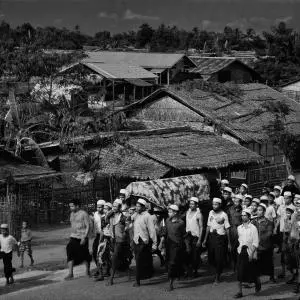
Who will save the Rohingya?
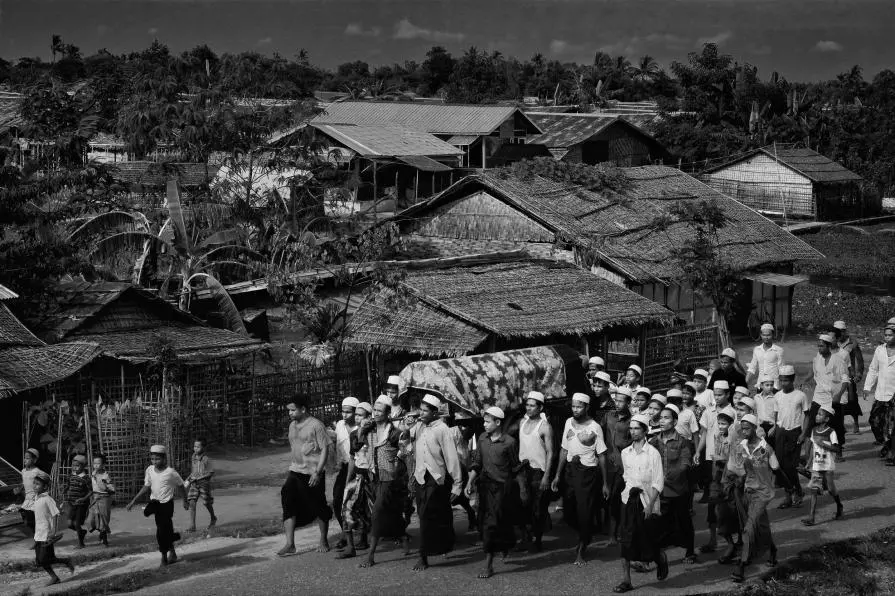
Myanmar, Rakhine State, Sittwe, That Kal Pyin village, Maw Tinyar camp, The camp is one of over 38 Rohingya camps on the perimeter of Sittwe on the western coast of Myanmar. Noor Jahan, a Rohingya woman over 60 has passed away this morning (3 October 2016). She had asthma and could not get oxygen. In a traditional muslim funeral men of the village are carrying the coffin to the graveyard. She will be buried this afternnon in Baw Duba, near Misi junction. Only men will pray at the graveyard. General caption; Who will save the Rohingya? The Rohingya Muslim minority is an inconvenient ethnic group for the new government of Myanmar. Burma (Myanmar) has a long history of conflict among its ethnic minorities propagated by an oppressive military junta. While many of the country's 135 ethnic minorities have been subjected to discrimination and human rights violations, only the Rohingya, the Muslim population of Burma's western Rakhine state that borders Bangladesh, have been stripped of all rights including citizenship (1982). They are stateless refugees, now living in IDP camps at the mercy of intolerant Buddhists. In June 2012, a cortege led by radical Buddhist monks, Rakhine Buddhist civilians (discriminated against in their own right and fueled by decades of anti-Muslim sentiment) and police stormed thru Rohingya neighborhoods in the capital of Sittwe slaughtering people, burning homes and mosques. The "conflict" (as it is commonly referred to), well-orchestrated by the government, effectively displaced approximately 140,000 Rohingya forcing them into detention camps on the outskirts of the city. Those villages that were not destroyed have been cordoned off. Today, 4 years later (Oct. 2016), be it in a camp or a village, the Rohingya have no freedom of movement, no access to comprehensive medical care or higher education, and they cannot work. They rely solely on NGOs and their own families living in freedom elsewhere. While the country's historic turn towards democracy should be encouraging, the plight of the Rohingya is far from over and on the ground the prospects for this traumatized minority look rather grim.
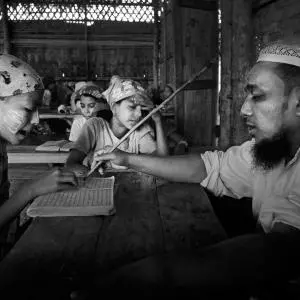
Who will save the Rohingya?
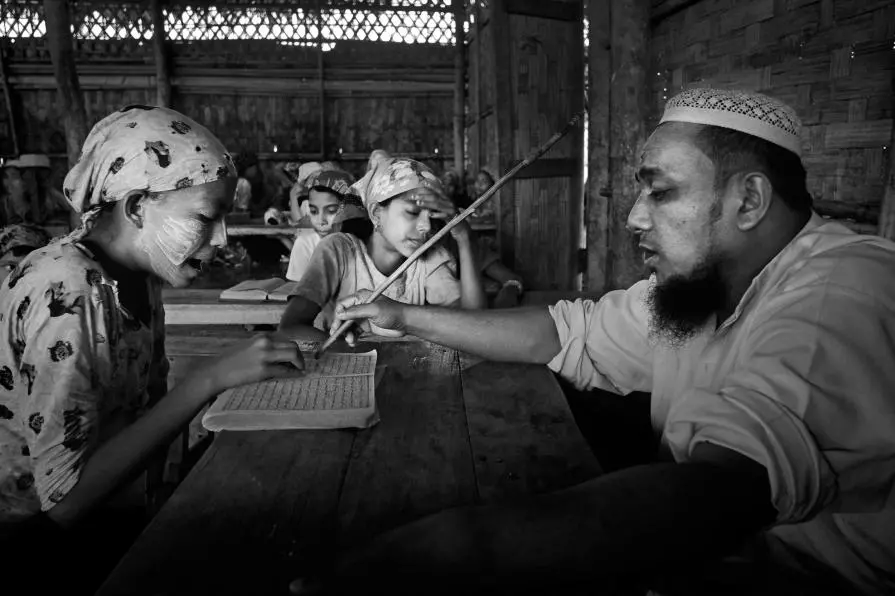
Myanmar, Rakhine State, Sittwe, That Kal Pyin village, Maw Tinyar camp, The camp is one of over 38 Rohingya camps on the perimeter of Sittwe on the western coast of Myanmar. With no access to formal education (government teachers cannot and do not want to come here), schooling up to grade 5 (age 10) is provided by Rohingya volunteers. At the edge of the camp, near what used to be a prawn farming lake, sits the temporary madrasa (Islamic school). Imam Mv. Innus has been giving classes everyday (except Friday) for the last 4 years. Before the conflict, he lived in Nasi, a neighbourhood in Sittwe, which is now exclusively Buddhist. General caption; Who will save the Rohingya? The Rohingya Muslim minority is an inconvenient ethnic group for the new government of Myanmar. Burma (Myanmar) has a long history of conflict among its ethnic minorities propagated by an oppressive military junta. While many of the country's 135 ethnic minorities have been subjected to discrimination and human rights violations, only the Rohingya, the Muslim population of Burma's western Rakhine state that borders Bangladesh, have been stripped of all rights including citizenship (1982). They are stateless refugees, now living in IDP camps at the mercy of intolerant Buddhists. In June 2012, a cortege led by radical Buddhist monks, Rakhine Buddhist civilians (discriminated against in their own right and fueled by decades of anti-Muslim sentiment) and police stormed thru Rohingya neighborhoods in the capital of Sittwe slaughtering people, burning homes and mosques. The "conflict" (as it is commonly referred to), well-orchestrated by the government, effectively displaced approximately 140,000 Rohingya forcing them into detention camps on the outskirts of the city. Those villages that were not destroyed have been cordoned off. Today, 4 years later (Oct. 2016), be it in a camp or a village, the Rohingya have no freedom of movement, no access to comprehensive medical care or higher education, and they cannot work. They rely solely on NGOs and their own families living in freedom elsewhere. While the country's historic turn towards democracy should be encouraging, the plight of the Rohingya is far from over and on the ground the prospects for this traumatized minority look rather grim.
Who will save the Rohingya?
The Rohingya Muslim minority is an inconvenient ethnic group for the new government of Myanmar.
Burma (Myanmar) has a long history of conflict among its ethnic minorities propagated by an oppressive military junta. While many of the country's 135 ethnic minorities have been subjected to discrimination and human rights violations, only the Rohingya, the Muslim population of Burma's western Rakhine state that borders Bangladesh, have been stripped of all rights including citizenship (1982). They are stateless refugees, now living in IDP camps at the mercy of intolerant Buddhists.
In June 2012, a cortege led by radical Buddhist monks, Rakhine Buddhist civilians (discriminated against in their own right and fueled by decades of anti-Muslim sentiment) and police stormed thru Rohingya neighborhoods in the capital of Sittwe slaughtering people, burning homes and mosques. The "conflict" (as it is commonly referred to), well-orchestrated by the government, effectively displaced approximately 140,000 Rohingya forcing them into detention camps on the outskirts of the city. Those villages that were not destroyed have been cordoned off. Today, 4 years later (Oct. 2016), be it in a camp or a village, the Rohingya have no freedom of movement, no access to comprehensive medical care or higher education, and they cannot work. They rely solely on NGOs and their own families living in freedom elsewhere.
While the country's historic turn towards democracy should be encouraging, the plight of the Rohingya is far from over and on the ground the prospects for this traumatized minority look rather grim.
 Share / Save
Share / Save














Comments 0
Say something